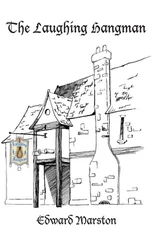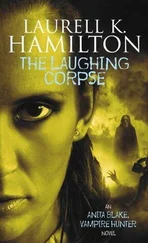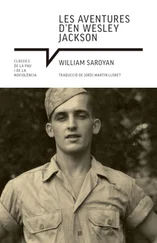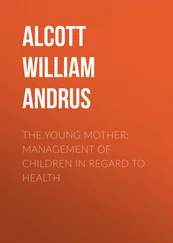He left the house, got in his brother’s car, and drove off, the man standing on the porch.
Dr. Altoun returned to the room and sat there a long time, trying to think. He got up at last, and went to the back yard and spoke to the woman.
“Let them not understand,” he said. “Their mother is buried. Let it be said that she is away on a visit with her mother and father. Their father’s brother is dead. Let it be said that he is asleep. I will lock the door of his room for this night. Their father is mad with grief. He is gone. He cannot help. He will not be helped. Let them not understand their mother is dead, their father is mad, their father’s brother is dead. I will spend the night, waiting for the return of their father. If he does not return by morning you must take them to your home and keep them. I will help you. If their father returns, I will help him. They are there in the vineyard at play. Let them not understand of death and madness. You are a mother. You will do this.”
“Yes,” the woman said.
Dr. Altoun walked slowly along the row of vines to where they were sitting in the shade of a vine.
“Hi,” Red said.
“Who is it?” Eva said.
“Doctor Altoun, Eva.”
The man plucked a bunch of Red Emperors from a vine and began to eat them, looking at the children. Each of them was strong, alive, alone, and so real as to hurt even a man who was every day in the presence of pain and death.
“Did you come to talk to us?” Eva said.
“I came to see you,” the man said.
“Do you see us?”
“Yes.”
“What do you see?”
“A brother and a sister.”
“No,” Eva said. “A king and a queen.”
(King Love, Queen Beauty? he thought.)
“Which king, which queen?” the doctor said.
“King him and queen me,” Eva said. “Didn’t you know? He’s the king and I’m the queen. It’s true, isn’t it, Red?”
“Yes,” Red said. He looked at the man earnestly, so earnestly it hurt the man. “It is true,” he said. “King Red, Queen Eva. You believe us, don’t you?”
“Yes,? the man said.
“King of the Vineyard,” Red said. He reached up, plucked a bunch of grapes from the vine, handed them to Eva, then plucked a bunch for himself, and they began to eat the grapes. “King of the Vineyard, Queen of the Vine,” Red said.
“No, Red,” the girl said. “King of the Vineyard, Queen of the King.” She turned to the man. “Isn’t that right?”
“Is it right?” Red asked earnestly.
“What do you think?” the man said.
“It seems right,” Red said.
“It is right,” Eva said. “Isn’t it?” she said to the man.
“Yes, it is,” he said, and turned to go.
“Don’t go,” Red said.
“Yes, don’t go,” Eva said. “Let’s talk some more.”
“I’d love to,” the man said, “but I’ve got some things to do. We’ll talk another time.”
He turned and walked back to the house.
The boy took a green leaf from the vine and held it out to the girl.
He then let earth sift through his fingers, after which he took by the tail a horned toad he had captured an hour ago, picking it out of the cigar box into which he had put it with a bunch of grapes. He held it up, its small legs swimming, then put it back in the box.
“He’s alive,” Red said. “He’s alive and he’s mine.” He looked into the box at the horned toad. “But he won’t eat the grapes.”
“Why?” Eva said.
“I guess he doesn’t like Red Emperors.”
“What does he like? Muscats? Malagas?”
“No,” Red laughed. “He doesn’t like any kind of grapes. He likes dirt.”
“Then give him some,” Eva said. “Poor little—— What’s his name, Red?”
“Horny toad.”
“Poor little horny toad,” Eva said. “Give him some dirt.”
Red put some dirt into the cigar box.
“Do you want him?” he said to his sister.
“Yes, Red, I want him very much.”
Red picked up the box and handed it to her.
“All right,” he said. “He’s yours.”
“Forever, Red?”
“I don’t know how long they last,” Red said, “but you can have him as long as they do.”
The girl lifted the lid of the box, looked at the horned toad, then said, “Poor little—— What’s his name?”
“Horny toad, Eva!”
“Horny toad,” Eva said. “What shall I do with him? Smash him?” She nodded gayly several times.
“No,” Red said. “He’s all—he’s all fixed up that way. You don’t want to spoil the way he’s fixed up, all the nice horns.”
“What, then?” Eva said. “Shall I give him a little bath?” She thought a moment, then said, “No, I know what.”
“What?”
“I’ll give him to Mama. For her birthday.”
“When is Mama’s birthday?” Red said.
“Day after tomorrow?”
“No.”
“Day before yesterday?”
“No!”
“When, then?”
“The day she was born , Eva. Don’t you even know what birthday means?”
“What does it mean?”
“It means the day you were born.”
“And then,” Eva said, “you get born again every time it’s your birthday?”
“No.”
“You get dead, then, every time it’s your birthday?”
“No, Eva! Birth! Day! The day you were born. You don’t get dead on your birthday!”
“When, then?” Eva said. “On your deadth day?”
“Deadth day?” Red laughed.
The woman, who had been such an adventure to them, came down the row of vines, singing a slow song in the language.
She looked down at them, her eyes loving them.
“Now, King Red,” she said. “Now, Queen Eva. We gonna have it nice bath. Then we gonna have it nice supper. Then I gonna tell it nice story.”
“What kind of a story?” Eva said.
“I gonna tell it true story, Queen Eva.”
“Did it happen to you, Mary?” Red said.
“This story happen to—who you think?”
“Who?” Red said.
“You , King Red! You, Queen Eva!”
“But we know what happened to us,” Red said. “Don’t we, Eva?”
“We know every bit of it,” Eva said. “I was there, Mary. And Red was there. Everybody saw us. We saw them. That’s what happened.”
“This is other story,” Mary said. “This is love story. You get up now.”
They got up and began to walk with her out of the vineyard to the house.
“Is it sad?” Red said.
“Yes,” the woman said.
“Why?” Red said.
“It is true story, King Red, and true story is sad,” she said.
“What is a story?” Eva said. “What is that?”
“A story is a true thing, Queen Eva,” the woman said.
She took their hands and squeezed them with love, and they knew it was love.
He would talk to the man. He wouldn’t hate him. He wouldn’t be angry, but he would take the man by the throat, very nearly stop his breathing, and then let him live, after all. He would then drive night and day until he reached Paterson. He would go to the house Petrus had made for his sons. We would walk through the streets of his boyhood. He would walk along the Passaic, as he had done more than thirty years ago, with Dade.
He was at the summit of Pacheco Pass between Los Banos and Gilroy at sundown, the car sailing swiftly around the curves, the view of the deep valley of Hollister a magnificent but meaningless thing to see now.
He stopped the car a block from the man’s house, walked there, and went upstairs to the door. He knocked softly, for he would not hate him, would not be angry. The door was opened by a girl who was probably no more than nineteen, a student in one of the man’s classes, no doubt.
Читать дальше












